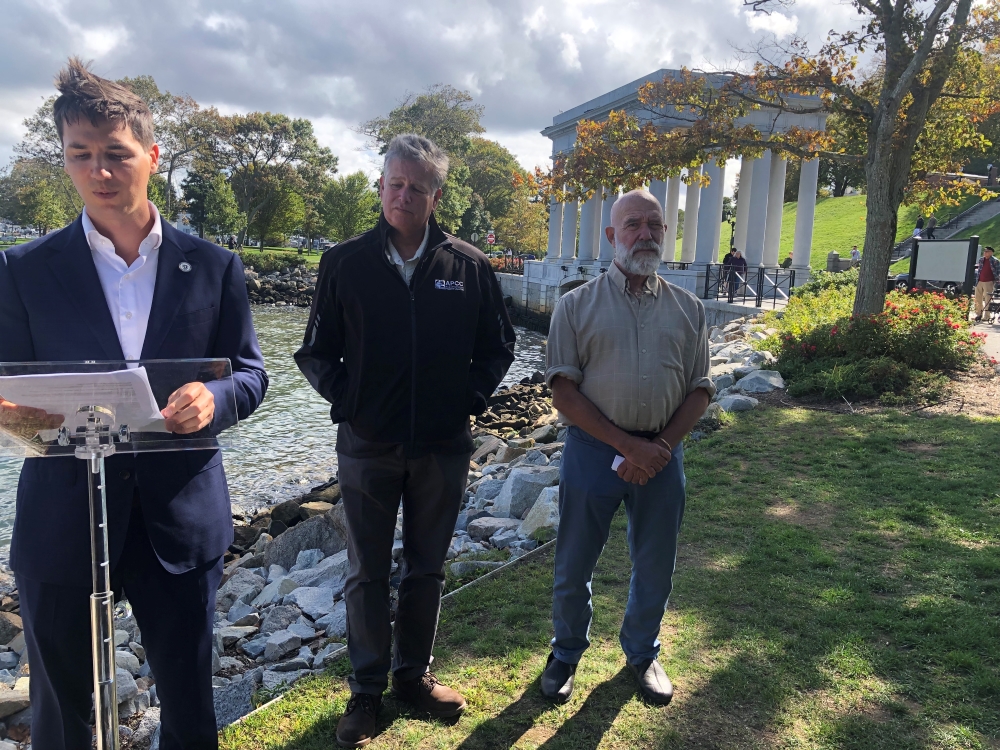The Association to Preserve Cape Cod and the Cape Cod Commercial Fishermen’s Alliance, along with state Rep. Dylan Fernandes, held a press conference at Plymouth Rock Wednesday to announce their opposition to the release of 1.1 million gallons of treated radioactive wastewater from the Pilgrim nuclear power plant.
In July, the state Department of Environmental Protection denied Holtec International – the company decommissioning the plant – a permit to release the treated wastewater into Cape Cod Bay, but Holtec is appealing the decision to the department’s chief hearing officer. The area is a protected sanctuary under the Massachusetts Ocean Sanctuaries Act, which prohibits the discharge of industrial wastes into protected state waters.
Wednesday’s event made it clear that Holtec’s critics are not assuming that the appeal will be swiftly rejected.
Andrew Gottlieb, executive director of the Association to Preserve Cape Cod, called Holtec’s appeal an attempt to buy it more time. Meantime, Holtec is slowly evaporating radioactive water from the plant.
“It’s a cynical delay tactic to give them time to continue find ways to dispose of this wastewater at the public’s expense, not at their own,” Gottlieb said. He estimated that the appeals process could take up to two years.
“Dumping treated nuclear wastewater into Cape Cod Bay harms our region’s ability to market itself as a tourist, beach, seafood destination and harms our local fishing industry,” said Fernandes, a Falmouth Democrat who is running for a seat in the state Senate against state Rep. Matt Muratore.
Muratore, of Plymouth, also opposes the release of the wastewater into the bay.
“The entire South Shore-Cape Cod delegation are behind the fact of not having Holtec discharge the water into Cape Cod Bay,” Muratore said. “We’ve all been very clear about that.”
The Holtec opponents on Wednesday said they plan to file a motion to intervene against the appeal, which they want dismissed.
Also joining the motion to intervene against the company’s appeal are the Cape Cod Association of Realtors, the Cape Cod Chamber of Commerce, and several private citizens. Another group, Pilgrim Watch, has already filed its own motion to intervene against the appeal.
Seth Rolbein, senior outreach and policy advisor for the Cape Cod Fishermen’s Alliance, accused Holtec of trying to cut costs by choosing to release the water into the bay instead of trucking it to another part of the country for storage. That would allow it to keep a bigger portion of the Decommissioning Trust Fund set up to cover the cost of decommissioning Pilgrim and storing the spent fuel on site, Rolbein said. The fund was paid for with a surcharge on electric bills of Boston Edison customers until the Plymouth power plant was sold to New Orleans-based Entergy in 1999, which operated it until the time of its shutdown in May 2019.
“For them to dump this water into this bay is their cheap way out, and we don’t appreciate that as fishermen and as community members because we’re paying for them to do it the right way and they owe it to us to get that done,” Rolbein said.
In an emailed statement, Holtec said that the opposition to its releasing the wastewater into the bay has delayed the decommissioning process for years.
“Our goal to clean-up Pilgrim in eight years has already been delayed as a result of the challenges to safe discharges, which had occurred for over 45 years of plant operation and are regulated by the [Nuclear Regulatory Commission],” said Holtec spokesperson Patrick O’Brien. “We will continue to work through the appeal process, as allowed for in regulations, and look forward to a determination from our appeal that was filed.”
The Pilgrim plant began operating in 1972. The shutdown more than five years ago came after a long decline in the demand for nuclear-generated electricity, mostly because of rising costs.
Fred Thys can be reached at fred@plymouthindependent.org.

